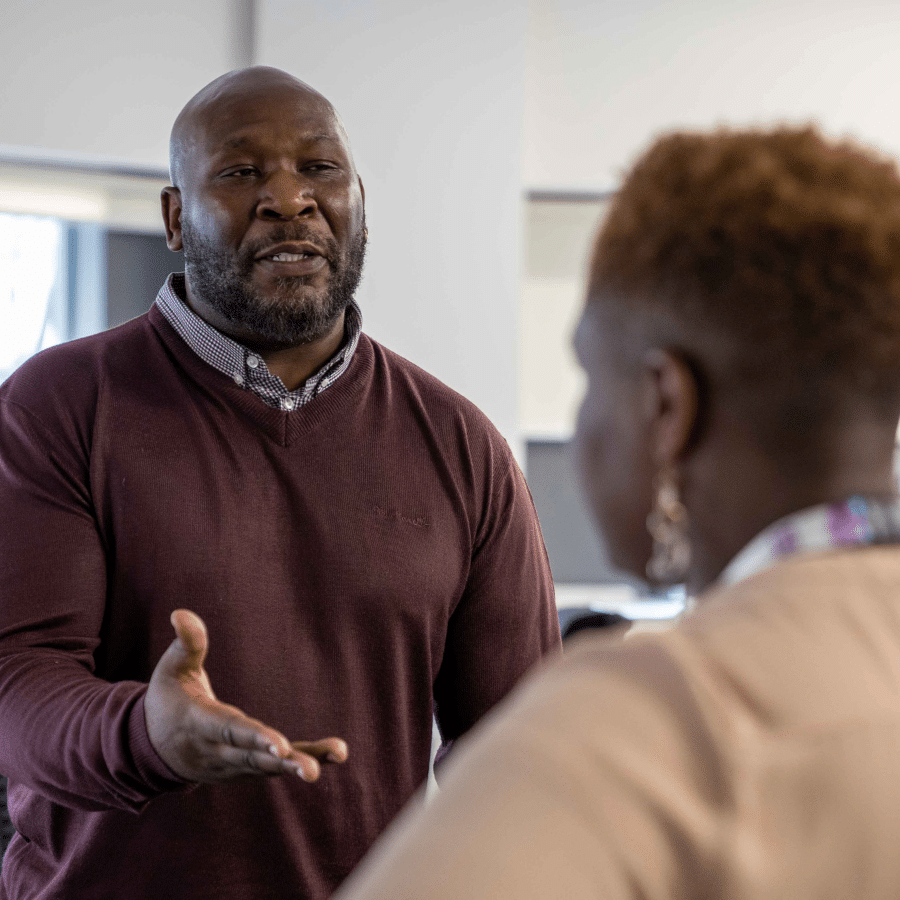Published by Skills for Justice
Difficult conversations in the workplace
Date 31.01.24

Navigating difficult conversations in justice sector workplaces is essential. Although they can require a delicate blend of empathy and transparency, being able to embrace these conversations means that justice professionals can create adaptive learning environments. This blog will discuss the importance of timely, inclusive and considerate communication, and how this helps promote a culture of continuous development.
Working amidst complexity
In the modern workplace, opportunities for impactful, challenging conversations crop up time and time again. In recent years the justice sector – in particular frontline services – has been pushed to the edges of its capabilities, managing with limited resources in response to a volatile, uncertain, complex and ambiguous (VUCA; Bennis & Nanus, 1985) world. Amid the turmoil, it has become clear that organisations and the people within them have little choice but to adapt and overcome hurdles that present themselves in a complex and dynamic environment.
Difficult conversations present themselves in all shapes and sizes, including but not limited to:
- Giving effective feedback (peer, colleague, line manager or direct reports).
- Performance reviews.
- Presenting new developments that affect others.
Consider the occasions where you have sat with the decision to either walk away or lean into tough conversations boldly and bravely. There will likely be a few times that you can recount, some that were avoided, others that went well and perhaps a handful that didn’t go as hoped. Nonetheless these necessary interactions can be difficult for both the persons initiating and receiving the message.
Why do conversations matter?
The act of preparing and engaging well in these conversations is a nuanced and often undervalued people and leadership skill that has the potential to influence employee experience and organisational culture.
Research such as the recent meta-analysis of 30,000 plus workers (Katz et al, 2021) indicates the power of setting up these conversations well e.g., quality, delivery, and support. These factors can influence receptivity, levels of comfort engaging in conversation, and how proactive an employee becomes in seeking feedback in the future.
At an individual level, these conversations can increase job satisfaction, engagement, psychological empowerment, and decrease burnout and intentions of leaving a role. Whether these interactions are with colleagues or clients, they can provide a chance to build and enhance healthy working relationships. It is no surprise that this contributes towards healthy teams and organisations who are open to learning and shifting priorities in response to the ever-changing landscape.
How to approach a challenging conversation
Research and experience suggests to us that receivers are open to these conversations when they perceive that the interaction was delivered by a credible source, with quality in mind, and in a considerate manner. Although there is no one solution or panacea for approaching all difficult conversations, guidance can be adapted so that you maintain individuality and authenticity in your communication style. It is fundamental to recognise and respect diversity in our teams and organisations and to adopt an inclusive and person-centred approach.
1. Act in a timely manner whilst also balancing the needs of the individual.
2. Take into consideration individual preference for communication and apply this wherever possible. Prepare in advance.
3. Create a psychologically safe environment (Edmondson, 2018).
- Ensure that your environment is appropriate and confidential.
- Role model integrity and be open about your own fallibility.
4. Demonstrate compassion. Michael West emphasises Compassionate Leadership (West, 2020) in which leaders demonstrate empathy and understanding in their interactions.
- Listen with curiosity to the perspective of the individual.
- Summarise and reflect key points to ensure you have understood correctly.
5. Be clear and transparent in your communication.
- Get to the point using non-jargon, accessible language.
- Illustrate with specific examples to enhance understanding.
- Give the individual ample opportunity to ask questions and clarify their understanding to ensure alignment.
- Share written communication as good practice and amend as appropriate to ensure accuracy.
6. Offer support. This may look like:
- Proactively setting time aside to discuss further, if helpful.
- Inviting the individual to continue the conversation in the future.
- Offering practical information or suggestions moving forwards.
- Asking the individual what support they would find beneficial.
Challenging conversations may be tempting to evade at work, especially alongside the pressures of the role and complex environment. However, the risk of choosing not to engage in difficult conversations can act as a vote for a culture that remains static and safe, glazing over opportunities to identify areas for positive development and creative problem-solving— key skills required to navigate our VUCA environment.
The more people across the justice sector that can embrace and role model healthy developmental conversations, the more likely we are to promote learning cultures that can adapt and become responsive as opposed to traditionally reactive. Leaning into difficult conversations fosters a commitment to continuous improvement, ultimately to better serve our communities.
A leader’s capability in which to have healthy, effective, conversations can be developed through learning activities such as coaching.
To help develop yours, or your team’s, leadership and management skills, it’s important to ensure you have the right resources and services in place. Skills for Justice can provide leadership and management coaching with a range of specialist coaches available to work with.
Our coaches have industry leading experience in the justice sector. Read our case study on executive coaching for the Ministry of Justice, or get in touch with our team using the form below.
Get in touch
"*" indicates required fields
References
- Bennis, W., & Nanus, Burt (1985). Leaders: The strategies for Taking Charge.
- Edmondson, A. C. (2018). The fearless organization: Creating psychological safety in the workplace for learning, innovation, and growth. John Wiley & Sons.
- Katz, I. M., Rauvola, R. S., & Rudolph, C. W. (2021). Feedback environment: A meta-analysis. International Journal of Selection and Assessment, 29, 305–325. https://doi.org/10.1111/ijsa.12350
- West, M.A. (2020). Compassionate and Collective Leadership for Cultures of High-Quality Care. In: Montgomery, A., van der Doef, M., Panagopoulou, E., Leiter, M.P. (eds) Connecting Healthcare Worker Well-Being, Patient Safety and Organisational Change. Aligning Perspectives on Health, Safety and Well-Being. Springer, Cham. https://doi.org/10.1007/978-3-030-60998-6_13




